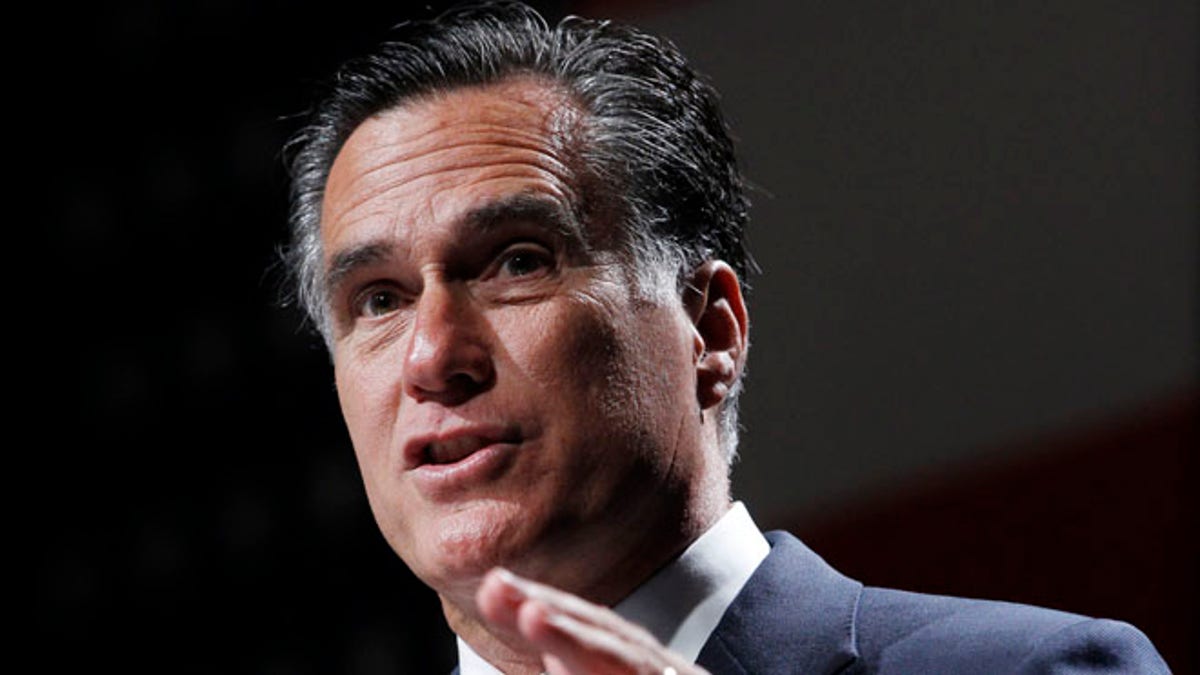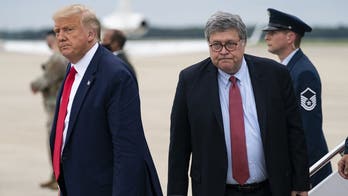
FILE: June 21, 2012: Mitt Romney campaigns in Orlando, Fla. (AP)
Mitt Romney, the candidate so often criticized for seeming to avoid the issue of immigration now that the GOP primary is over, is scheduled to be in – of all places – Arizona on Monday.
All eyes are on the Grand Canyon State Monday after the U.S. Supreme Court handed down its decision on Arizona’s tough law on illegal immigration. The High Court struck down most of the Arizona's law, known as SB 1070, but upheld a provision that allows state and local police to perform roadside immigration checks if they have "reasonable suspicion" that the person is in the country illegally. The U.S. Dept. of Justice had argued before the court that immigration is purely a federal matter.
During the extended GOP primary, Romney, who will be attending campaign fundraisers in Arizona, took an exceptionally hard line on immigration in debates and campaign appearances.
He said that he looked to Arizona’s controversial approach to immigration – particularly E-Verify, used to confirm the eligibility of people to work in the United States legally – as a model for the nation and added that if he was president he would stop all federal lawsuits against state laws such as Arizona’s SB 1070.
The former Massachusetts governor also reaffirmed his support for building a wall on the U.S.-Mexican border and vowed to veto the so-called DREAM Act, a measure that would give such immigrants a path to legalization as long they meet a strict set of criteria, including graduating from a U.S. high school, going to college or serving in the military, and staying out of trouble with police.
During the primary, Romney courted some of Arizona’s most high-profile immigration hardliners, including Sheriff Joe Arpaio, whom the U.S. government has gone after for what it charges is his abusive treatment of Latinos, and Gov. Jan Brewer, who signed SB 1070 into law two years ago. Brewer endorsed Romney.
Romney also has a close alliance with the chief architect of Arizona’s immigration law – Kris Kobach, the Kansas Secretary of State, who says hard-line policies on illegal immigration will push undocumented immigrants to “self deport” by making their lives too difficult in this country.
But after he became the expected GOP presidential nominee, Romney’s campaign has preferred to avoid highlighting immigration, at times expressing exasperation with those who raise the issue and ask for a comment on various aspects of it.
In April, on a visit to Arizona, Romney, who won the state's primary, went out of his way to avoid discussing immigration, and even let questions about the issue -- put to him at a meeting with Latino leaders there -- go unanswered.
The major reason for the shift in rhetoric is a concern in his campaign and GOP leaders that Romney has alienated Latino voters, seen as crucial to this year’s election.
On Thursday, in an address to the National Association of Latino Elected and Appointed Officials, or NALEO, at the group's annual convention, Romney announced that he would support a path to legalization for undocumented youth who sign up to serve in the military. He also said he would remove some of the obstacles legal immigrants who are not naturalized U.S. citizens face when trying to bring relatives from overseas to the United States as legal permanent residents.
Though in polls likely Latino voters say immigration is not their top concern – the economy, education and healthcare preoccupy them much more, they say – they can be turned off by rhetoric about immigration that seems hostile or insensitive to Latinos. Political analysts say Romney would need at least 40 percent of the Latino to have a shot at the White House.
The Supreme Court has suggested that it might be leaning toward approving at least parts of SB 1070, which requires police officers to check the immigration status of people they think are in the country illegally.
Both Liberal and conservative justices reacted skeptically to the Obama administration's argument earlier this year that the state exceeded its authority when it made the records check, and another provision allowing suspected undocumented immigrants to be arrested without a warrant, part of the Arizona law aimed at driving undocumented immigrants elsewhere.
"You can see it's not selling very well," Justice Sonia Sotomayor told Obama administration Solicitor General Donald Verrilli.
Follow us on twitter.com/foxnewslatino
Like us at facebook.com/foxnewslatino




